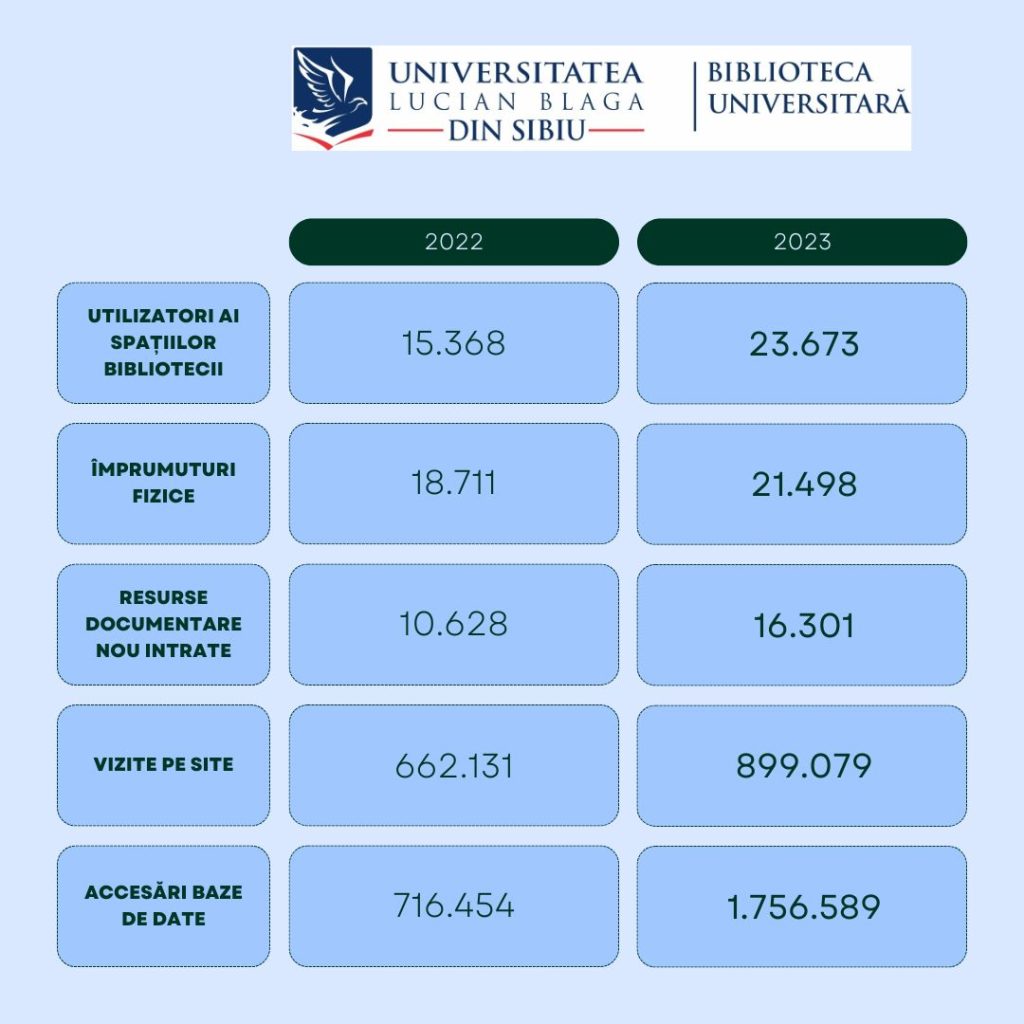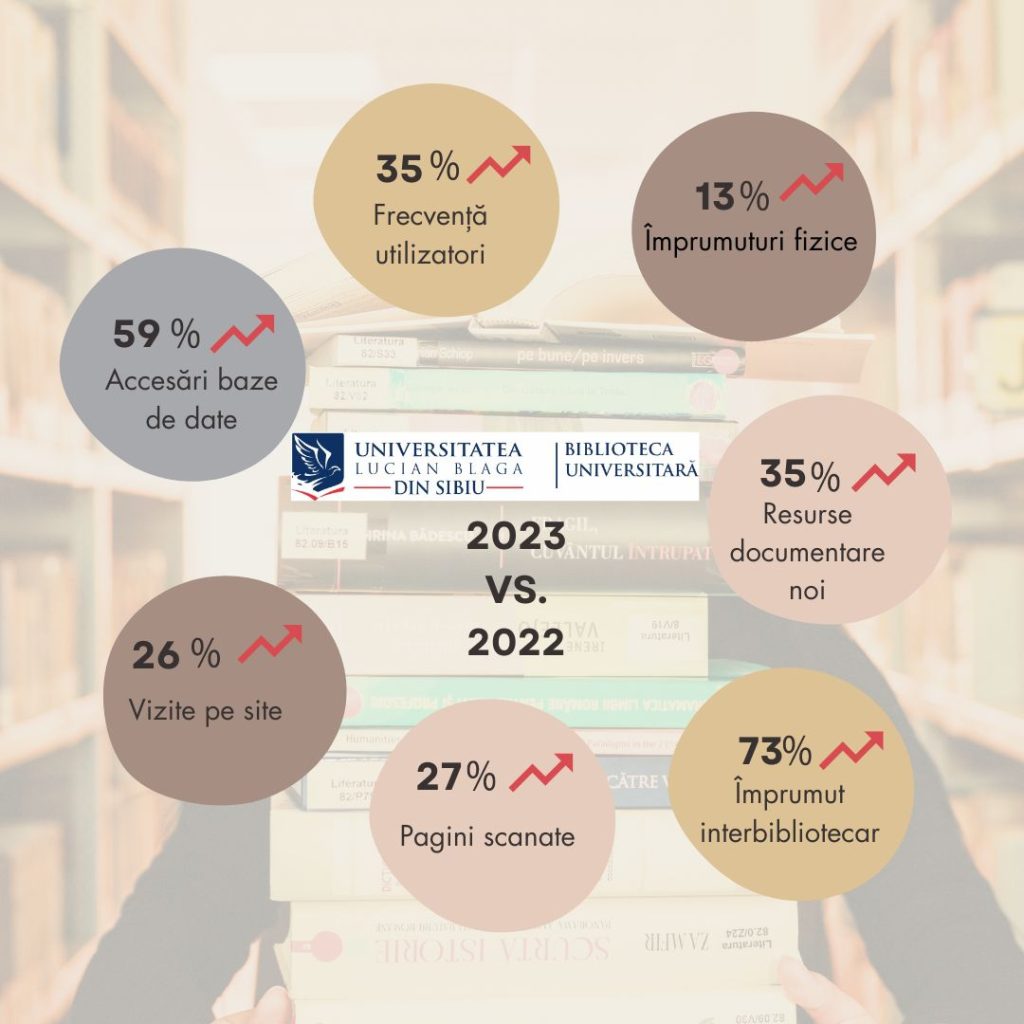User Information
Activity Report for 2023
A structure with an essential role in supporting the teaching and research activity of ULBS, the university library continued in 2023 the process of transformation, reorganization and updating in line with the needs and expectations of our users. In contrast to the previous year, marked by the gradual lifting of Covid-19 period-specific restrictions and the outbreak of war in Ukraine, 2023 was marked by the effort to reconnect offline with readers and to continue the process of developing the digital services and resources offered by the library. We prioritized increasing the number of users, developing documentary collections through acquisitions and subscriptions (print and electronic formats), increasing access to available resources through digitization and organization of digital collections, and better understanding the needs and expectations of our users.
To this purpose, efforts have continued to re-design the spaces, to improve communication with the users and to understand the needs and expectations of teachers and researchers in all fields of study. Following meetings with representatives of student associations and groups of students who constantly come to the reading rooms, the need for extended opening hours, allowing access to the library on weekends and after 8 pm during the week, was emphasized, as many students work or have hectic weekday schedules.
Meetings with the heads of the faculties, organized in the first months of the year, were followed by the appointment of library staff responsible for each faculty, with the task of regularly communicating news, proposals for acquisition/subscription, promoting the library services and organizing training sessions on the subscribed databases.
Two team-working cabinets have been set up, starting with the academic year 2023-2024 and, following several requests coming in particular from students of the Faculty of Medicine, the hours of opening to the public have been extended until 22:00 during the week and between 10:00-18: 00 on weekends; the process of digitization of resources was intensified and a procedure for a stricter selection of donations was developed, shifting the emphasis of collection development towards the acquisition of new books, both in electronic and printed formats, in line with the requests of teachers, researchers and students. The need for space to grow and to constantly update the collections has involved not only periodically moving and rearranging collections, but also drawing up an inventory to propose more than 56,000 documentary units for disposal. A library volunteering program was started, attracting students from several majors at ULBS, and a quarterly library newsletter was launched. There has been an emphasis on better organizing student internships at the library for students following the Information and Documentation Sciences degree program at the Faculty of Letters and Arts. In addition to our efforts to transform the library into a hub of student life, we have continued to organize and host academic, educational and cultural events aimed at diversifying the local cultural offer and strengthening the Sibiu academic community.
The statistics reflect the increase in library use, both analog (attendance at the reading rooms) and digital, even though in terms of library attendance we have not yet reached the figures of the pre-pandemic period (in 2019, the library was attended by 26,325 users). Thus, compared to 2022, when the library reading rooms were frequented by 15,368 users, in 2023 there were 21,267 users in the reading rooms, plus 502 users of the Internet Room on the ground floor of the library, 745 users of the individual study rooms and 92 groups of up to 5 users for the 2 group study rooms, 699 users in the branch libraries. In total, 23,673 users were present in the library study spaces. These figures do not include people attending various events, seminars, workshops, conferences or guided tours. They do not include students or academics who use the library’s downstairs lobby for class breaks. In 2023, there were 61 guided tours and visits to present the library’s collections to groups of first-year students, pupils of high schools in Sibiu or other counties, students or teachers of other Romanian or foreign universities. Also, educational events, programs or projects have been held and organized in the library, approx. 2.400 people from Sibiu’s academic environment or public persons in the age range of 7 – 70 years participated in the various activities.
Physical borrowing also increased from 18,711 (of which 3,984 were in branch libraries) in 2022 to 21,498 in 2023 (respectively 4,016 in branches), despite the considerable increase in the use of resources available online. In this matter, it should be emphasized that since before the pandemic, the LBUS Library has been on a downward trend in terms of borrowing, a global trend, that can be explained by the online availability of many resources. While 2015 was a peak year in this regard, with 45,735 loans reported, the numbers have gradually decreased to 8,075 in 2021 (27,832 in 2019). Also on the lending aspect, as a consequence of the promotion of library services, there was an increase of around 70% in inter-library loans in 2023 (359 publications were requested).
Virtual reference transactions, as per requests managed through Liberty5 Library’s computerized catalog, increased from 50,331 in 2022 to 57,722 in 2023, with virtual visits to the library’s networked resources reaching 946,911 searches.
The increased use of resources available in digital format (digitized/online bibliographies related to courses) is evidenced by the increase in traffic to the ULBS library website, from 662,131 hits in 2022 to 899,079 in 2023. It should be noted that the number of accesses exceeds the rate of access to the website in the period 2020-2022, the pandemic and related restrictions, when the library activity was shifted to a considerable extent to the online area (587,838 accesses in 2020 and 709,928 accesses in 2021). Access to ULBS subscribed databases has also increased significantly, from 716,454 accesses in 2022 to 1,756,589 in 2023, with the increase in the number of databases subscribed through the Anelis Plus project and their promotion among the ULBS academic community also contributing to this spectacular growth.
Last but not least, the increase in the number of documentary units entered in the library (from 10,628 in 2022 to 16,301 in 2023) and in the number of pages scanned (from 159,051 pages in 2022 to 281,247 pages in 2023) should be emphasized. Regarding the development of the LBUS library collections, in contrast to 2022, when books and periodicals entered as donations accounted for 56% of new additions, with the remaining being acquisitions (40%) and resources received under interlibrary exchange agreements (3%), in 2023 donations accounted for only 4% of new additions, 91% were the result of new book acquisitions, and 5% resulted from interlibrary exchange agreements. In the last quarter of the year, in line with legislative changes at the national level, the LBUS Library was reorganized to merge two offices into one department, a measure that involved the abolishment of one management position.
More details here in the full report.


Announcement May 2024


